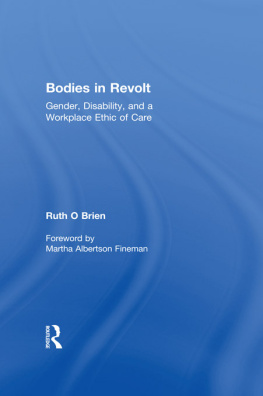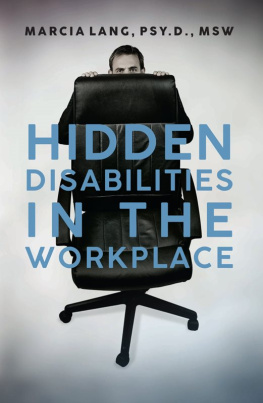Published in 2005 by
Routledge
Taylor & Francis Group
711 Third Avenue
New York, NY 10017
Published in Great Britain by
Routledge
Taylor & Francis Group
2 Park Square
Milton Park, Abingdon
Oxon OX14 4RN
2005 by Taylor & Francis Group
Routledge is an imprint of Taylor & Francis Group
International Standard Book Number-10:
0-415-94534-8 (pb: alk. paper)
0-415-94533-X (hb : alk. paper)
International Standard Book Number-13:
978-0-4159-4534-9 (pb : alk. paper)
978-0-4159-4533-2 (hb : alk. paper)
No part of this book may be reprinted, reproduced, transmitted, or utilized in any form by any electronic, mechanical, or other means, now known or hereafter invented, including photocopying, microfilming, and recording, or in any information storage or retrieval system, without written permission from the publishers.
Trademark Notice: Product or corporate names may be trademarks or registered trademarks, and are used only for identification and explanation without intent to infringe.
Library of Congress Cataloging-in-Publication Data
OBrien, Ruth
Bodies in revolt: gender, disability, and a workplace ethic of care/Ruth OBrien.
Includes bibliographical references and index.
1. People with disabilitiesEmploymentUnited States. 2. People with
disabilitiesEmploymentLaw and legislationUnited States. 3. Sex
discrimination in employmentUnited States. 4. Age discrimination in
employmentUnited States. 5. Industrial relationsSocial aspectsUnited
States. 6. Quality of work lifeUnited States. 7. Feminist ethics. I. Title:
Gender, disability, and an alternative ethic of care. II. Title.
Visit the Taylor & Francis Web site at
http://www.taylorandfrancis.com
and the Routledge Web site at
http://www.routledge-ny.com
Preface
Early one Monday morning in Maine, I was talking with a former disability rights litigator, Sharon Miller. We were headed toward the airport, having just finished a weekend-long session editing legal commentary for Voices from the Edge: Narratives about the Americans with Disabilities Act . Feeling good that we had accomplished so much over the weekend and that I had profited greatly from Sharons input, I hesitated spoiling the atmosphere by telling her about my new theory project. Then I spilled it. As I quickly conveyed the argument, I could feel her bristle.
You know she said cautiously, what youre arguing is precisely what employers already thinkthat the Americans with Disabilities Act gives employees too much power in the workplace.
I know, I said. Then added, But Sharon, this is theory , not reality.
Elaborating, I explained that I well knew that the Americans with Disabilities Act (ADA) has given too little relief to persons with disabilities, whether in the work force or seeking employment. Indeed, my first book on disability, Crippled Justice: The History of Modern Disability Policy in the Workplace , had explained how and why federal court judges had interpreted the ADAs Title I, or employment provisions, so narrowly that they, in effect, had gutted this part of the law.
But still, I told Sharon, having studied both labor law and civil rights law helped me understand just how significant a departure from American law the ADA is. What I wanted to explore here was how in theory the ADA has tremendous potential to bridge the individual rights and collective divide in American law. Hence this book should not be interpreted as anything more than a vision, and a utopian one at that.
Like all utopian visions, the motive behind this one is to cast light on existing problems. I hope that this vision reveals the tribulations that most employees face since American labor laws have become so feeble and the federal courts have effectively eroded Title VII protections for women and persons of color under the Civil Rights Act.
Another reason I gave Sharon for writing this book is to make some readers aware that they harbor biases against persons with disabilities. By labeling every person as having a disability, or in all likelihood going to have one, I hope to make those readers feel uncomfortable. Perhaps by demonstrating that the very proposition that experiencing disability is a universal part of life and living, this book will help them discover their own prejudices (conscious or not) against persons with disabilities.
Seeing my point and yet still fretting that some employers might pick up this book and inappropriately use it as evidence to defeat persons with disabilities in the workplace or trying to find work, Sharon came up with a clever idea.
You ought to add a disclaimer, she said.
So here it isa disclaimernot for Sharon, a defender of disability rights, but for all those who would purposefully mistake theory or this utopian vision for reality.
There is no small number of people to thank for helping me write a theoretical book. I owe Winston Fisk, my undergraduate thesis advisor, my first debt of gratitude. Winston encouraged me to think theoretically about ideas and action in a way that was particularly unorthodox at Claremont McKenna College. He gave me free range in writing my undergraduate thesis about how the former Yugoslavias system of worker self-management was based on Hegelian Marxism, Husserlian phenomenology, and Heideggerian existentialism. Although a mouthful, the thesis itself is entirely forgettable. What I do remember and draw upon is the courage he instilled in me to explore how the realm of ideas affects seemingly mundane policies and programs.
It is to Martha Fineman that I owe another debt of gratitude. She enticed me into exploring a universal notion of an ethic of care. Martha opened the door for me to feminist theory, exposing its universal applications. She encouraged me to think big and expansively about the ADA. And of course, Im grateful to Martha for gracing this book with an elegant foreword.
I must thank Michael Dooner, who showed me how he experienced quadriplegia while working in a high-powered law firm long before I knew Id be writing about disability policy. Im only sorry hes not here to read it. Linda Findley, his partner at the time, offered me inspiration, showing me how disability represents difference, not a physical malady.
My colleagues, family, and friends also gave me the requisite guidance to write the book. Judith Baer, Alyson Cole, and Gretchen Ritter offered shrewd comments that helped me turn this into a better book. Meanwhile, Chloe Atkins, Marshall Berman, Mark Blasius, Jane Cohen, Nancy Hirschmann, Eileen McDonagh, Sally Engle Merry, Jill Norgren, Corey Robin, Philippa Strum, and Joan Tronto offered insightful criticism about different aspects of the overall argument. A Professional Staff Congress award gave me some much needed release time and funds for computer equipment. Two Ph.D. students in political science at the Graduate Center of the City University of New YorkJoe Cleffie and Jason Schulmandid a terrific job tracking down sources. I was thankful that my editor, Rob Tempio, also picked up this project with as much enthusiasm as his predecessor, Eric Nelson.











